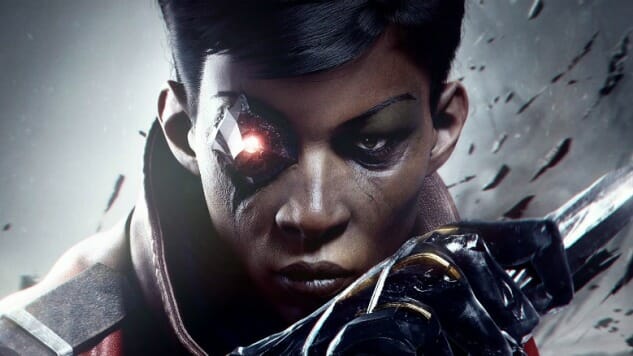
I walk along the edge of the roof, scanning the ground for guards. I know that they know that I’m here, but they don’t know what I can do. They don’t know how deep the depths of my anger and frustration go. In a moment, I am across the street, blinking from rooftop to rooftop. In another moment, I am muffling a target’s scream as I slit his throat.
And god, it feels so rewarding.
Death of the Outsider, the 2017 standalone expansion of 2016’s Dishonored 2, puts sideline character, Billie Lurk, in the center stage. Unlike Emily Kaldwin (the young empress), or Corvo Attano (the empress’s father), Billie has no qualms about killing.
In previous Dishonored games, lethality was a choice. Less killing meant less chaos, which meant that later levels of the game would be relatively easier. It was a mechanic meant to show that killing had weight, that killing led to people fearing you and preparing harder for your arrival.
But Billie Lurk is already feared, already an outcast, already someone who everyone wants gone. She has no home, and she has no path forward that isn’t defined by revenge. Unlike Emily or Corvo, Billie is a nobody.
And thus, Billie has no reason to give mercy to the imperial guards, nor anyone else in front of her blade. She was born in the streets, taken in by the erstwhile mercenary Daud, and trained in the ways of killing and dark magic. She is black. She is queer. She has had everything taken from her. And for once, there are no shackles on the supernatural armory that has kept her alive her entire life.
I’ve written quite a bit about how Wolfenstein II: The New Colossus felt like a game uniquely suited for the anger of today. But Death of the Outsider, with its machineries of empires and alliances, poor and the rich in tense proximity, feels just as apt for our contemporary anxieties.
I don’t think it’s much of a spoiler to say that Death of the Outsider revolves around a plot to eventually kill the enigmatic Outsider, the godlike being who bestows supernatural power on the protagonists of the Dishonored series. My first reaction to this was confusion—why would a series that was built on supernatural ability, decide to end itself with ridding the world of that supernatural ability?
The thing about Death of the Outsider is that it feels, in many ways, to be the most politically-minded Dishonored game. It is a story about revenge, yes, but ultimately it is about power. The rich denizens of Karnaca (and Dunwall before it) were always depicted as ignorant, brutish and orgiastic in their wealth. But it isn’t until Death of the Outsider that we see this fully explored. The end of inequality (the game posits) must include the end of power itself. There is no wholesome path forward without it.
Dante Douglas is a writer, poet and game developer. You can find him on Twitter at @videodante.